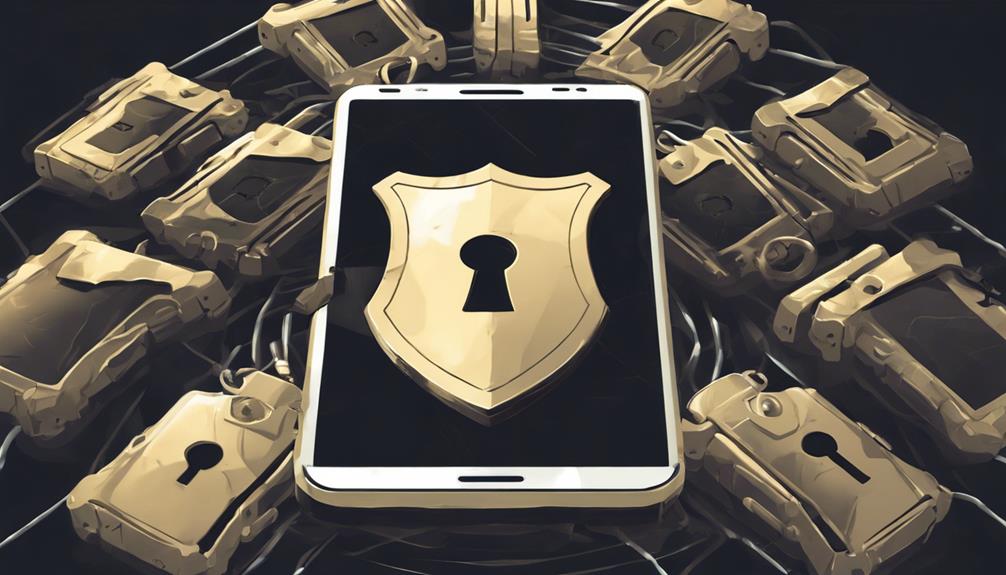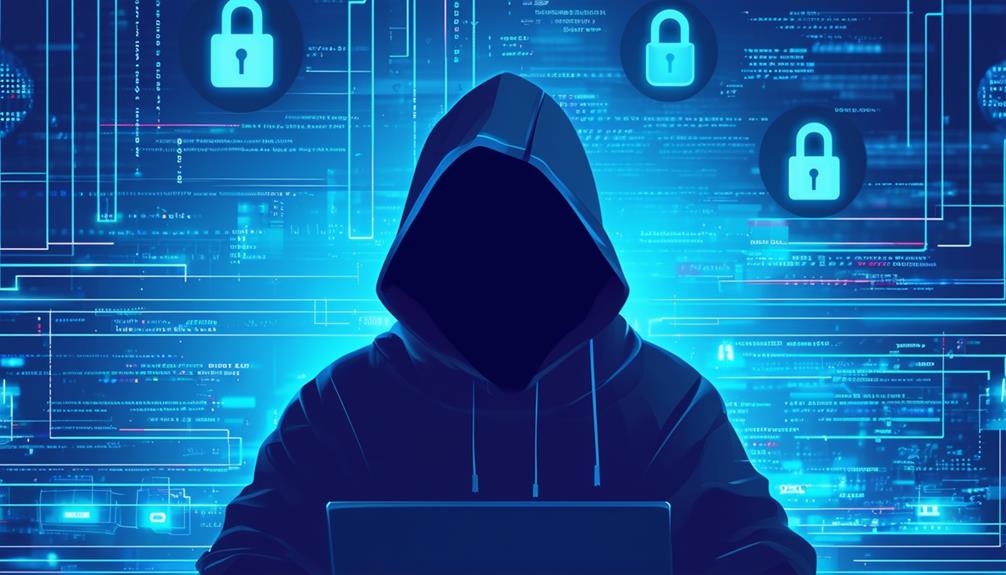When weighing between security or ethical hacking careers, understand their distinctions in roles, skills needed, and prospects. Security emphasizes defending systems, while ethical hacking involves identifying vulnerabilities. Essential technical skills for both include Python proficiency and familiarity with tools like Kali Linux. Certifications like CEH and OSCP validate expertise. Soft skills such as problem-solving and communication are crucial. Salaries vary with CEH professionals in the US earning $80,000 to $135,000, and OSCP holders averaging $92,000 to $113,000. To make an informed choice, consider personal interests, skills, and aspirations in these dynamic fields. More insights await on the road ahead.
Key Takeaways
- Evaluate interest in finding security weaknesses and conducting tests.
- Consider comfort with legal implications and ethical considerations.
- Assess technical skills and adaptability to evolving threats.
- Evaluate communication and problem-solving abilities.
- Choose based on personal fit, skills, and career aspirations.
Career Overview
In the domain of cybersecurity and ethical hacking, professionals play important roles in safeguarding organizations from digital threats and vulnerabilities.
Career paths in cybersecurity and ethical hacking offer diverse job opportunities, including roles such as security analyst and ethical hacker, with a focus on penetration testing to identify and address vulnerabilities. These fields require a range of technical skills and certifications for career advancement.
In Ireland, the average salary for cybersecurity professionals is €85,283, with a 10% salary growth in 2019, indicating a competitive salary range. The global job growth in cybersecurity positions has notably increased by 350% from 2013 to 2021, showcasing ample opportunities for specialization and career progression.
Moreover, diversity and inclusion are essential in cybersecurity, with efforts needed to address the underrepresentation of women and ethnic minorities in the industry, emphasizing the importance of a diverse workforce in combating digital threats effectively.
Skills and Requirements

Proficiency in programming languages like Python, technical understanding of computer science basics, and familiarity with tools such as Kali Linux are essential skills for both cybersecurity specialists and ethical hackers.
In addition to technical proficiency, ethical considerations play a significant role in the field of hacking, emphasizing the importance of ethical hacking certifications like Certified Ethical Hacker (CEH).
Soft skills like effective communication and problem-solving abilities are equally important for success in cybersecurity and ethical hacking careers, underscoring the multifaceted skill set required for these roles.
Essential Hacking Skills
Key technical competencies required for ethical hackers encompass a strong command of Python, a working knowledge of Kali Linux, and a deep understanding of network protocols. These skills serve as the foundation for successful ethical hacking endeavors.
In addition to technical prowess, soft skills play a pivotal role in the effectiveness of ethical hackers. Problem-solving abilities, critical thinking skills, and attention to detail are essential for maneuvering the complex landscape of cybersecurity.
Additionally, certifications such as Certified Ethical Hacker (CEH), Offensive Security Certified Professional (OSCP), and CompTIA PenTest+ validate the expertise and proficiency of ethical hackers in the field.
Ethical hackers must also stay abreast of the latest security trends to adapt to evolving threats effectively. Practical experience in conducting penetration tests, exploiting vulnerabilities, and reporting findings further refines the capabilities of ethical hackers in safeguarding digital systems.
Technical Proficiency Needed
To excel in the cybersecurity field, individuals must possess a robust set of technical skills and proficiencies that enable them to effectively combat digital threats and vulnerabilities. Key technical skills required include proficiency in programming languages such as Python, familiarity with tools like Kali Linux, and holding certifications like Certified Ethical Hacker (CEH). These skills are essential for conducting vulnerability assessments, ensuring network security, and implementing cryptography techniques to safeguard digital assets.
The table below summarizes the technical proficiencies needed for a successful career in cybersecurity and ethical hacking:
| Technical Skills | Proficiency Required | Importance |
|---|---|---|
| Programming Languages | Python | Essential for automation tasks |
| Kali Linux | Familiarity | Critical for penetration testing |
| Network Security | Strong understanding | Crucial for protecting data |
Apart from technical skills, soft skills like problem-solving, attention to detail, and critical thinking are equally important for effectively addressing security issues in both cybersecurity and ethical hacking roles.
Ethical Considerations in Hacking
- Understanding Legal Frameworks: Ethical hackers must familiarize themselves with laws and regulations governing cybersecurity to make sure their actions are within legal boundaries.
- Prioritizing Compliance: Adhering to industry standards and ethical guidelines is vital for ethical hackers to maintain a professional and lawful practice.
- Protecting Against Repercussions: Ethical hackers need to assess the potential consequences of their actions to mitigate any negative outcomes on themselves or their clients.
- Continuous Learning: Staying updated on the latest security trends and technologies is essential for ethical hackers to identify and address evolving vulnerabilities effectively.
- Ethical Decision-Making: Ethical hackers should always prioritize ethical considerations and make decisions that align with moral values to uphold the integrity of their profession.
Job Opportunities

The job opportunities in cybersecurity and ethical hacking are abundant, with a significant growth in demand projected globally. Professionals in these fields can expect promising career growth prospects due to the evolving nature of cyber threats and the continuous advancements in technology.
The industry trends indicate a robust demand for skilled individuals, with ample opportunities for specialization and advancement within the cybersecurity market.
Career Growth Prospects
Career growth prospects in cybersecurity and ethical hacking are promising due to the increasing demand for skilled professionals in defending against cyber threats. The industry offers job security, with a 350% increase in global cybersecurity positions from 2013 to 2021. Professionals in these fields can expect competitive salaries and diverse opportunities as the global cybersecurity market is projected to exceed $370 billion USD by 2029.
With evolving technology, the need for skilled cybersecurity experts continues to rise, providing a pathway for career growth. Ethical hackers, in particular, are highly sought after for their essential role in defending against threats, making their expertise invaluable in the cybersecurity industry.
- Rapid job growth in cybersecurity field.
- Job security due to evolving threats.
- Competitive salaries for skilled professionals.
- Diverse opportunities in the cybersecurity sector.
- High demand for ethical hackers to defend against cyber threats.
Industry Demand Trends
As the cybersecurity industry continues to expand rapidly, the demand for skilled professionals in defending against cyber threats is on the rise, presenting abundant job opportunities in the field.
Global job growth in cybersecurity positions has surged by 350% from 2013 to 2021, highlighting the escalating need for cyber defense experts.
Vital hackers play a pivotal role in this landscape by helping organizations stay ahead of evolving cyber threats and technology advancements.
The cyber security market is projected to grow substantially, further fueling the demand for skilled professionals who can navigate the complex digital landscape.
With the industry expected to be worth over $370 billion USD by 2029, it is evident that cyber security professionals earn not only competitive salaries but also enjoy a secure job outlook.
The significant growth in demand for cyber security professionals underscores the wealth of job opportunities available for individuals looking to pursue a career in this dynamic and critical sector.
Salary Comparison

In the field of cybersecurity professions, salary comparisons between ethical hackers and cyber security professionals reveal significant differences in average earning potential. When considering the average salary of Certified Ethical Hackers (CEH), it ranges from $80,000 to $135,000 in the United States.
On the other hand, Security Certified Professionals (OSCP) in cyber security jobs earn around $92,000 to $113,000 on average. Factors such as job titles, experience levels, and industry standards play a substantial role in determining the total pay in both fields.
It's important to take into account the average cost of living and benefits packages offered, as these can vary widely. Keep in mind that salary averages and ranges may also differ based on various sources and geographical locations, impacting the overall earning potential in ethical hacking and cyber security careers.
Training and Education

Training and education play a vital role in preparing individuals for successful careers in cybersecurity professions. Certifications such as Certified Ethical Hacker (CEH) and CompTIA Security+ are highly regarded in the industry, showcasing expertise in ethical hacking and security fundamentals. Online platforms offer a wide array of cybersecurity courses from reputable universities, allowing professionals to enhance their knowledge and skills conveniently.
For entry-level positions in cybersecurity roles, a bachelor's degree in computer science or a related field is commonly required. However, to explore more advanced aspects of cybersecurity and open up opportunities for leadership roles, pursuing advanced degrees like a Master's in Cybersecurity can be beneficial.
Continuous learning is essential in the cybersecurity field due to the ever-evolving nature of security trends and threats. Professionals must stay updated on the latest developments and techniques to effectively protect systems and data. Investing in ongoing education and training is critical for long-term success in cybersecurity careers.
Personal Fit

To determine the most suitable career path in cybersecurity or ethical hacking, individuals should evaluate their personal fit based on their interests, skills, and long-term aspirations.
When considering a career in ethical hacking, individuals should examine their interest in finding security weaknesses and conducting penetration tests. It is important to reflect on one's comfort level with potential legal implications and ethical considerations associated with ethical hacking.
Additionally, evaluating technical skills and the willingness to continuously learn and adapt to evolving cybersecurity threats is essential for success in both security and ethical hacking roles.
Furthermore, individuals should consider their communication and problem-solving abilities, as these soft skills play a significant role in thriving in cybersecurity and ethical hacking careers.
Exploring the diverse career paths and opportunities available in both cybersecurity and ethical hacking is also important to determine the best fit for long-term goals.
Frequently Asked Questions
Which Is Better, Ethical Hacking or Cyber Security?
Both ethical hacking and cybersecurity are critical components of safeguarding systems from cyber threats. Ethical hacking focuses on identifying vulnerabilities through testing, while cybersecurity involves a broader approach to protecting organizations from various cyber attacks.
Is Ethical Hacking a Good Career Option?
Ethical hacking presents a promising career option with high demand, lucrative salaries, and constant challenges. As a critical component of cybersecurity, ethical hackers play a pivotal role in safeguarding organizations against data breaches, making it a rewarding and impactful profession.
How Do You Know if Cyber Security Is for You?
Evaluating if cybersecurity is the right path involves gauging your interest in safeguarding organizations from cyber threats, enjoying the challenge of identifying vulnerabilities, and being motivated by the lucrative earning potential and rapid job growth within the cybersecurity field.
Is Cybersecurity the Right Career for You?
Considering the complex landscape of cyber threats and the critical need for safeguarding digital assets, pursuing a career in cybersecurity can offer a fulfilling and impactful professional journey for individuals dedicated to protecting sensitive information and combating cyber risks.
Conclusion
To sum up, both security and ethical hacking offer rewarding career paths with a high demand for skilled professionals.
While security focuses on preventing cyber threats, ethical hacking involves actively testing systems for vulnerabilities.
Ultimately, the choice between the two careers depends on individual interests, skills, and preferences.
With the ever-growing importance of cybersecurity in today's digital world, pursuing a career in either field can lead to exciting opportunities and a lucrative salary.
The possibilities are truly endless in this dynamic and constantly evolving industry.









